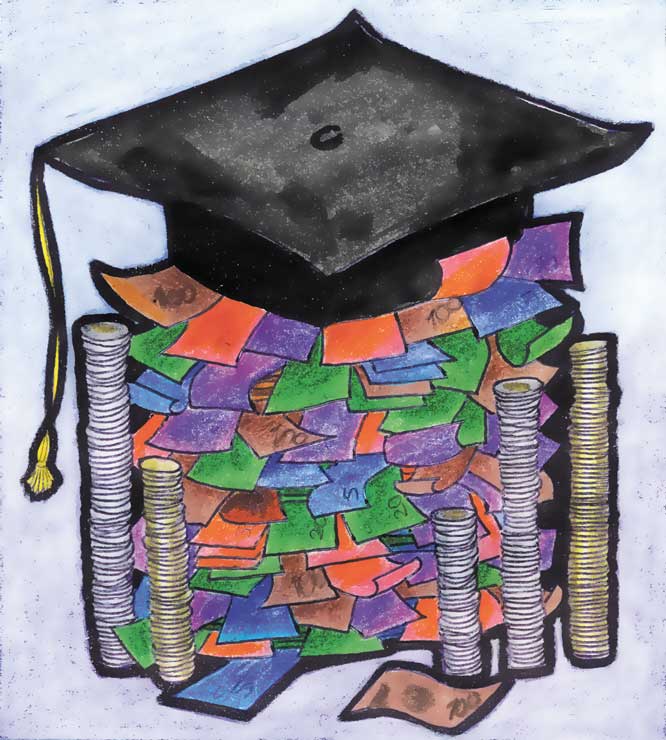
Understanding the politics of student fees on campus
Tuition increases are an unfortunate reality of post-secondary education. No one likes to hear they’ll have to pay more money to study on campus. That’s why we have a Students’ Union to organize our concerns and negotiate with administration and the provincial government.
Each year, the university requests the maximum tuition increase allowed by the province. Tuition increases in Alberta are capped by the Consumer Price Index. This means that the maximum increase in tuition that university administration can ask for is the rate of CPI. The CPI rate was 2.2 per cent this year, and administration is asking for the full increase in tuition.
At the U of C Board of Governors meeting on Dec. 12, the SU will vote on the 2.2 per cent tuition increase, as well as the proposed market modifiers. It’s still unclear if these two tuition increases will be bundled into one vote or if they’ll be separate.
Market modifiers have been the big student issue for the past three months. If you aren’t familiar with them, market modifiers are faculty-specific tuition increases for degrees that have a perceived higher earning potential, like engineering or business. Right now, the University of Calgary has submitted three proposals to the provincial government — law, undergraduate engineering and the MBA program.
The SU plans to vote against market modifiers. They’ve been steadfast in their belief that market modifiers are used by administration to get around the province’s legislation on tuition increases limited by the CPI. If the province approves U of C’s proposals, they’ll be voted on at this Board of Governors meeting. While the SU’s vote will be largely symbolic, students can be confident that it’ll be a firm no.
While the decision on market modifiers is an easy one, the SU’s choice on how to vote on the 2.2 per cent tuition increase was up for debate during Students’ Legislative Council. Voting no could make students appear petulant and stubborn after losing the fight on market modifiers. And voting yes could make it appear like our advocacy efforts on tuition increases were nothing more than meaningless rhetoric.
Most years, the SU votes in favour of the CPI-capped tuition hike. It’s a yearly tuition increase that the SU sees as rational and fiscally responsible. In recent memory, the only time the SU has voted against the CPI-capped tuition increase was in 2010, when the latest rounds of market modifiers were proposed at the U of C.
This time, the SU is on board with the usual tuition increase, even when market modifiers in two undergraduate faculties — law and engineering — are on the table. Their decision to vote yes on this fee hike was nearly unanimous. Only arts representative Kalista Sherbanuik argued that the SU should vote against the fee hike.
It’s a pragmatic call. With a vote that’s mostly symbolic, further straining relations with administration could bode poorly for consultation in the future. The SU is voting yes so they can hold sway on other issues, such as the lease negotiations over MacHall.
But there’s no use trying to save a relationship when the one we have isn’t working for students. University administration consistently treats student consultation as a speed bump to whatever tuition increase they’re in favour of. Negotiating with students happens only on the surface and only when we kick up a fuss.
When it comes to tuition increases, students and administration will rarely agree. But administration still has a responsibility to consult with students on the issues that affect us.
Over the past few months, administration has proved unwilling to consult with students on the issues we wanted to talk about. Instead, the university skipped over our concerns with raising tuition to ask where we wanted the money spent. Fee hikes were never really up for negotiation with students.
Spending a semester complaining about how administration won’t listen to students to turn around and vote like it’s business as usual hurts the SU’s credibility. We can rail against fee increases as much as we like, but students look toothless when we don’t back up our rhetoric.
Voting in favour of a standard CPI increase is normally the right decision. But after months of fighting over unjust and underhanded tuition increases with administration, it’s more than the CPI increase.
Sure, this is a token vote. The SU has one vote out of 21 on the Board of Governors. But when consultation doesn’t work because you aren’t being heard, you don’t continue doing the same thing and hope that something will change. Sometimes gestures of protest are important just for their symbolic value.
By voting no, the SU could prove that there are consequences when administration doesn’t listen to students. But we’re voting yes. Despite all the rhetoric, it’s back to business as usual.
Chris Adams, Gauntlet Editorial Board
